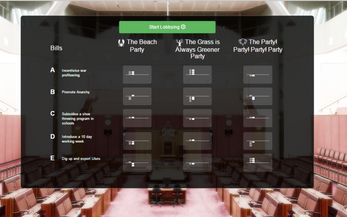Party Down Party Up
ABOUT THIS GAME
Fund parties, bribe politicians or expose other lobbyists to thwart their ambitions in this fast paced game of political intrigue and manipulation!
Party Down Party Up is a turn-based strategy game. Three to five players share a tablet or computer.
You are a lobbyist employed to ensure that certain bills do or do not pass parliament. You have some level of influence. You must use it wisely each turn to influence the political parties opinions on those key topics.
If you want to play it safe you can lobby in public. This will alert other players to which issues are important to you.
If you're prepared to take a risk you can get a better result with a bribe. But don't get caught! If another player successfully accuses you of bribery, they gain influence and you lose influence in the next round.
Players can also opt to throw others off the scent by influencing unrelated parties and policies.
After five rounds play ends. At this stage astute players will have enough information to target opponents precisely to maximise their own chances of success. Play lasts for about twenty minutes.
THE IDEA FOR THE GAME
We brainstormed about five different game ideas exploring the keywords of "voices" and "access". We then fleshed out the top three before embarking on a paper test of this particular idea.
We were particularly interested in the idea of voting as a way that members of society express their voice. Combined with the idea of gaining access to politicians, this game of strategy and deception was born.
The fairness and balance of the game was interesting to us, as well as figuring out how to get an element of fun in a game that is very much about numbers. We found that most of the enjoyment came from looking at the numbers and becoming suspicious of what the other players are trying to do. Accusations of bribery are exciting because they carry a heavy penalty for somebody regardless of the outcome.
GAMEPLAY INSTRUCTIONS
The Public Polls
At the beginning of the game and at the beginning of each new turn this screen is displayed and all the players can have a look and familiarise themselves with the parties' stances.
The Bills up for debate are all listed on the far left column from A to E.
On the same row as each bill there are 3 graphs showing the current stance of each political party.
The bars represent how strongly the party feels about the bill. When the bars are above the middle line the party is for passing the bill. If the bars are below the party is against.
Example: In the screenshot above the "Beach Party" is strongly for Bill A while "Party! Party! Party! Party" is against.
The screenshot is from the beginning of turn 2. The dark grey bars in each cell show what the party's stance was the previous turn and the white bars show the current stance.
Example: The Beach Party was against Bill B in the previous turn, but in this turn they are for. Someone must have done some serious lobbying or maybe even bribed them.
When the players are ready to play they click the green button to start lobbying.
Player Turns
On each player's turn the Bills that the player wants to pass or fail are highlighted in yellow. The amount of points the player can get from each bill is displayed next to the Bill description.
You can tell that the parties' opinions are in the players favour when they are green, otherwise they are red.
Example: On Bill E there are two parties against passing and one party for. If nothing has changed at the end of the game the bill will not pass and the player will not get any points for it, but if he influences at least one more party to vote for, the bill would be passed and the player gets 1 point.
The player starts with 2 influence points (displayed on the bottom left). Click on a graph to spend influence on bribing or lobbying a party. When both points are spent the next players turn starts.
INSTALLATION INSTRUCTIONS
Extract the zip file to a folder on your computer.
Double click on "index.html" to load it in your web browser.
Follow the instructions on-screen.
The prototype game has been tested most in Google Chrome on PC and Safari for iPad.
| Status | Prototype |
| Platforms | HTML5 |
| Author | marblefish |
| Genre | Strategy |

